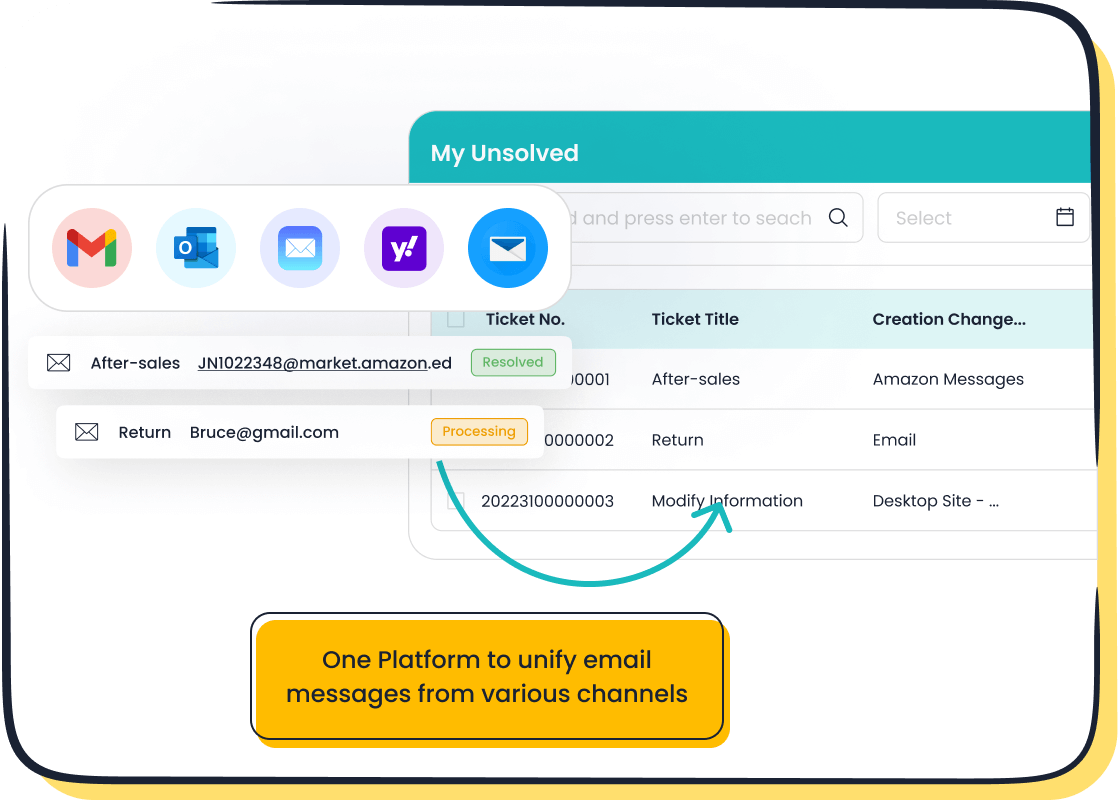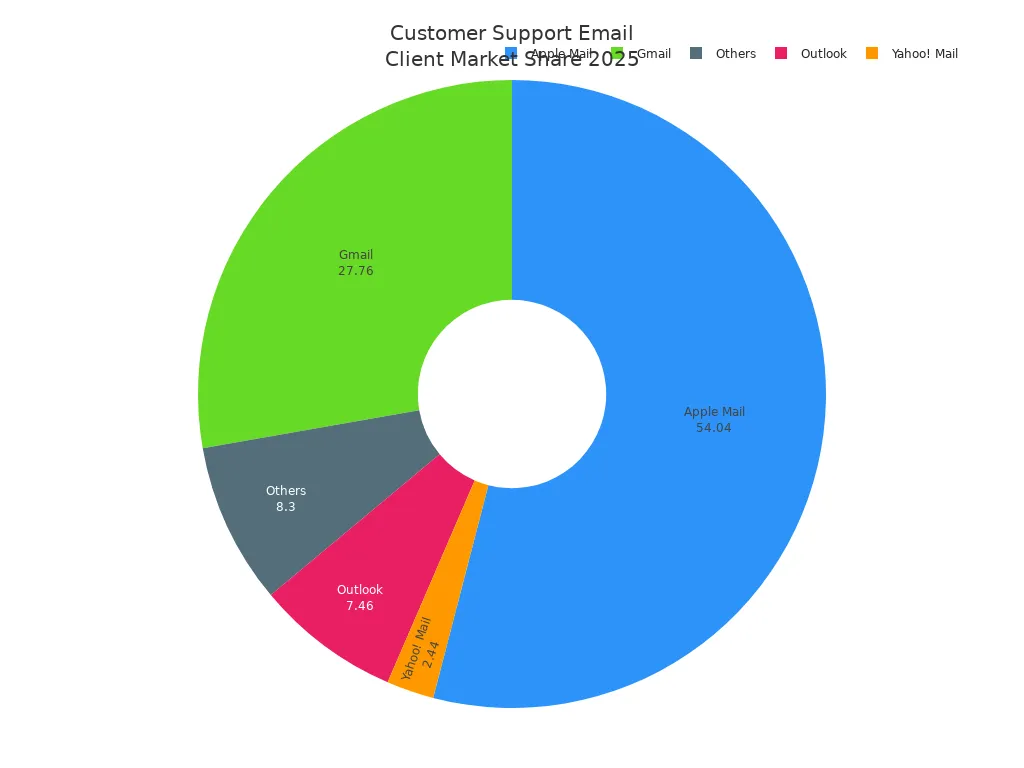Best Customer Support Emails Tools You Need This Year

Customer support emails shape the backbone of modern business communication in 2025. Leading tools such as Sobot Ticketing System, Help Scout, Hiver, and Salesforce Service Cloud enable teams to manage inquiries efficiently. Businesses see real benefits:
- Email management platforms improve scalability, enable 24/7 support, and foster team collaboration.
- Automation speeds up responses and helps meet SLA goals, boosting customer satisfaction.
- Fast replies build trust and increase repeat purchases (HubSpot).
- Sobot and Sobot AI unify channels and automate workflows, helping teams deliver outstanding service.
Choosing the right platform drives growth, efficiency, and loyalty.
Top Tools Overview

Best Customer Support Emails Platforms
Businesses in 2025 rely on a mix of email clients and specialized platforms to manage customer support emails. The most widely used email clients include Apple Mail, Gmail, and Outlook. These platforms dominate the global market due to their reliability, integration capabilities, and security features. The following table shows the market share of leading email clients:
| Email Client | Market Share (2025) | Notes |
|---|---|---|
| Apple Mail | 54.04% | Most popular email client globally |
| Gmail | 27.76% | Strong integration and security for support |
| Outlook | 7.46% | Preferred in enterprise environments |
| Yahoo! Mail | 2.44% | Smaller but reliable user base |
| Others | 8.3% | Includes Spark, ProtonMail, and more |

Outlook stands out in professional settings. Many organizations choose Outlook for its advanced calendar integration and robust security, making it a key tool for managing customer support emails in large businesses.
Note: While these email clients are essential, many companies also use dedicated platforms like Sobot Ticketing System to unify and automate customer support workflows.
Key Features at a Glance
The best customer support emails platforms offer features that help teams respond quickly, track issues, and maintain high service standards. Sobot Ticketing System, for example, provides unified handling across channels, AI-powered ticketing, and SLA management. Other platforms focus on deliverability, analytics, and security. The table below highlights core differentiators:
| Platform | Core Features | Pricing Highlights |
|---|---|---|
| Sobot | Unified channel management, AI ticketing, SLA reminders, analytics, multilingual support | Custom plans, scalable for all business sizes |
| SendGrid | Segmentation, mail send API, tracking, enterprise scalability | Essentials ($14.95+/mo), Pro, Premier |
| Amazon SES | Security, inbox deliverability, analytics, phishing protection | Pay-as-you-go: $0.10/1,000 emails |
| Mailgun | Customization, analytics, drag-and-drop editor, suppression management | Free trial, Foundation ($35/mo), Growth, Scale |
| Postmark | High deliverability, monitoring, bounce prevention, templates | From $10/mo (10K emails) |
| SparkPost | Real-time alerts, spam detection, two-factor authentication, SSL encryption | Starter ($20/mo), Premier up to $525/mo |
Sobot stands out by integrating email, chat, and voice into one workspace, automating ticket assignment, and supporting multilingual communication. These features help businesses handle customer support emails efficiently and improve customer satisfaction.
Why Customer Support Emails Matter
Definition and Core Benefits
Customer support emails serve as a direct line between businesses and their customers. These emails help companies answer questions, solve problems, and build trust. Fast and helpful responses create positive experiences. When customers receive instant support, they feel valued and understood. This leads to stronger connections and higher loyalty.
A case study from Allied Global showed that instant support systems helped a telecom client reach a 75% retention rate. Quick replies and targeted follow-ups show customers that a business listens and cares. Retaining customers costs up to seven times less than finding new ones, according to Harvard Business Review. Personalized and segmented emails also improve communication, making customers more likely to return.
Tip: Businesses that use customer support emails to follow up on product requests or feedback often see better reviews and increased repeat sales.
Impact on Customer Service Teams
Customer support emails help service teams work smarter. Ticketing systems, like the one from Sobot, organize all messages in one place. This allows teams to assign, track, and resolve issues quickly. Standardized templates save time and keep communication clear.
Automation and self-service tools handle simple questions, freeing agents to focus on complex problems. Proactive updates about outages or changes reduce the number of incoming emails. A knowledge base lets customers find answers on their own, lowering the team's workload.
Sobot’s unified platform combines email, chat, and voice channels. This integration streamlines workflows and boosts efficiency. Teams can monitor performance with analytics and set reminders for important tasks. As a result, customer support emails not only improve customer satisfaction but also help teams deliver better service with less effort.
Reviews of Leading Tools

Sobot Ticketing System
Sobot Ticketing System provides a unified platform for managing customer support emails, chat, and voice interactions. The system integrates WhatsApp Business API and AI-powered chatbots, enabling efficient multi-channel communication. Automation handles routine queries, reducing response times and easing the workload for support teams. The user-friendly dashboard allows for easy ticket tracking, product creation, and payment processing. AI-driven inventory and order management features help businesses operate smoothly.
Sobot stands out for its deep industry understanding and flexible AI integration. The platform supports multilingual communication and offers customizable dashboards. Businesses can set up custom triggers, automate ticket routing, and manage SLAs with ease.
Pros:
- Unified handling of all channels
- AI-powered ticketing and automation
- Customizable dashboards and analytics
- Multilingual support
Cons:
- Some users may face a learning curve with advanced features
Ideal Use Cases:
Retail, e-commerce, financial services, and enterprises needing scalable, omnichannel support.
Customer Story:
Opay, a leading financial service platform, used Sobot to unify customer support across email, social media, and voice. After implementation, Opay increased customer satisfaction from 60% to 90%, reduced costs by 20%, and boosted conversion rates by 17%. The unified system allowed Opay to manage high volumes of customer support emails and other inquiries efficiently.
Learn more about Sobot Ticketing System
Zendesk
Zendesk centralizes customer communications from email, chat, social media, and SMS into one ticketing system. The platform offers automation tools for ticket routing and auto-responses. Users can personalize their workspace, organize tickets with multiple views, and use bulk actions to boost productivity. Zendesk’s reporting tools help teams monitor performance and identify areas for improvement.
Pros:
- Multi-channel support
- Customizable workspace
- Automation and collaboration tools
Cons:
- Steep learning curve for new users
- High subscription costs for advanced features
- Limited export and customization on lower-tier plans
Ideal Use Cases:
Large organizations needing advanced automation and integration with other business tools.
Help Scout
Help Scout targets small to medium-sized businesses with a simple, intuitive interface. The platform offers shared inboxes, knowledge bases, and automation workflows. Teams can collaborate using mentions and private notes. The Beacon widget allows customers to access help directly on any webpage. Help Scout integrates with tools like Slack and Shopify, making it easy to fit into existing workflows.
| Pricing Tier | Target Business Size | Key Features | Pricing |
|---|---|---|---|
| Basic | Small teams (up to 10 users) | Entry-level, shared inbox | $8/user/month |
| Standard | Small to medium teams | Analytics, automation, integrations | $20/user/month |
| Plus | Medium to larger teams | Advanced reporting, unlimited mailboxes | $32/user/month |
Pros:
- Easy setup and clean interface
- Affordable for small teams
- Strong collaboration features
Cons:
- Reporting less advanced than some competitors
- Limited customization for complex workflows
Ideal Use Cases:
Startups, e-commerce, SaaS, education, and non-profits needing quick deployment and reliable customer support emails.
Freshdesk
Freshdesk offers automated and manual two-way emailing, converting emails into tickets with tagging, priority, and assignment features. The platform supports proactive outreach, canned responses, and knowledge base integration. Users can schedule emails, import contacts, and manage campaigns. Freshdesk also allows linking third-party inboxes and provides push notifications for new emails.
Pros:
- Comprehensive email-to-ticket conversion
- Proactive outreach and campaign management
- Knowledge base integration
Cons:
- Limited reporting and analytics on lower-tier plans
- Some advanced features require technical expertise or higher-tier plans
- Mobile app lacks full functionality
Ideal Use Cases:
Businesses seeking a flexible solution for managing customer support emails and campaigns.
Salesforce Service Cloud
Salesforce Service Cloud integrates with ERP, CRM, and network management systems, providing a holistic view of customer interactions. The platform supports automated ticketing, billing, and order management. AI-powered agents manage inquiries across multiple channels, while service analytics help optimize support operations. Integration with Community Cloud enables self-service portals, and Field Service Lightning manages mobile workforce operations.
Pros:
- Seamless integration with business systems
- AI-powered automation and analytics
- Self-service and mobile workforce management
Cons:
- Customization and integration can be complex and costly
- Data migration and security concerns
- Steep learning curve for new users
Ideal Use Cases:
Enterprises needing deep integration with existing business systems and advanced automation for customer support emails.
Hiver
Hiver integrates directly within Gmail, allowing teams to manage shared inboxes without leaving their familiar workspace. The platform offers automation rules for categorizing and assigning emails, unified inboxes, and collision detection to prevent duplicate replies. SLA tracking and multi-level access control help maintain accountability. Hiver supports internal collaboration through private notes and leverages Google Workspace security protocols.
Pros:
- Seamless Gmail integration
- Automation and collaboration features
- Mobile-friendly access
Cons:
- Slow response times reported by some users
- Setup can be challenging for new teams
- Pricing may be high for small businesses
Ideal Use Cases:
SMBs and teams using Google Workspace for streamlined customer support emails.
Intercom
Intercom leverages AI-powered chatbots and automation to resolve up to 50% of support questions instantly. The platform collects information upfront, giving agents full context for faster resolution. Intercom’s AI summarizes conversations, automates repetitive tasks, and delivers personalized service. Features include an AI-enhanced inbox, Copilot for agent assistance, omnichannel support, and a knowledge hub.
Pros:
- Advanced AI and automation
- Omnichannel support
- Personalized customer experience
Cons:
- Less structured ticket management
- Expensive and opaque pricing
- Limited advanced reporting for agents
Ideal Use Cases:
Growing businesses seeking to automate customer support emails and improve efficiency with AI.
Customer Support Emails Comparison

Feature Comparison Table
Selecting the right tool for customer support emails depends on understanding the differences in features. Each platform offers unique strengths. Some focus on automation, while others excel in analytics or team collaboration. The table below highlights how leading tools compare across key categories:
| Feature Category | Sobot Ticketing System | Hiver | Help Scout | Salesforce Service Cloud | Groove | Zoho Desk |
|---|---|---|---|---|---|---|
| Automation | Advanced AI, triggers | Basic rules | Workflow | AI-powered | Basic | Customizable |
| Categorization | Priority, templates | Tags, folders | Tags | Custom fields | Folders | Custom views |
| Tracking | SLA, analytics | SLA, notes | Reports | Advanced analytics | Activity logs | Reports |
| Integrations | E-commerce, WhatsApp | Gmail | Slack, Shopify | CRM, ERP | Gmail, Outlook | Zoho apps |
| Customization | Dashboards, triggers | Limited | Moderate | Extensive | Limited | High |
| Scalability | High | Small teams | SMBs | Enterprise | Small teams | Mid-large |
| Security | 99.99% uptime, GDPR | Google secure | Standard | Enterprise-grade | Standard | GDPR, CCPA |
| Team Collaboration | Unified workspace | Shared inbox | Notes, mentions | Multi-team | Shared inbox | Collaboration |
| Accessibility | Web, mobile | Gmail | Web, mobile | Web, mobile | Web | Web, mobile |
Note: Sobot Ticketing System stands out with unified channel management, advanced automation, and multilingual support, making it ideal for businesses seeking efficiency and global reach.
Pricing and Value
Pricing models for customer support emails tools vary by business size and feature needs. Small businesses often choose Groove or Hiver for affordability and simplicity. Mid-sized companies may prefer Zoho Desk or Help Scout for customization and automation. Large enterprises invest in platforms like Salesforce Service Cloud for advanced integration and analytics.
| Tool | Pricing Model | Best For | Value Proposition |
|---|---|---|---|
| Sobot Ticketing System | Custom, scalable plans | All business sizes | Unified channels, AI, analytics, multilingual |
| Hiver | Subscription, per user | Small businesses | Gmail integration, easy setup |
| Help Scout | Tiered subscription | SMBs | Collaboration, knowledge base |
| Salesforce Service Cloud | Tiered, enterprise pricing | Large enterprises | Deep integration, advanced analytics |
| Groove | Affordable, tiered | Small businesses | Simple, essential features |
| Zoho Desk | Per user, customizable | Mid-sized businesses | Custom workflows, automation |
Businesses should consider hidden costs like training and support. Sobot offers flexible plans that scale with growth, providing strong value for companies managing high volumes of customer support emails.
Choosing the Right Tool
Key Selection Criteria
Selecting the right platform for managing support communications requires careful evaluation. Businesses should focus on these essential criteria:
- Ease of use and setup: A user-friendly interface with drag-and-drop tools helps teams work efficiently.
- Scalability: The platform must support growing teams and increasing message volumes.
- Automation and analytics: Built-in automation and reporting features save time and provide insights.
- Pricing flexibility: Plans should fit different budgets and allow for growth.
- Reliable customer support: Fast, multi-channel assistance ensures smooth operations.
- Security and compliance: Adherence to regulations like GDPR and strong data protection is critical.
- Customization: The ability to tailor workflows and branding to business needs.
- Integration: Compatibility with CRM, e-commerce, and social media tools streamlines workflows.
| Criteria | Explanation |
|---|---|
| Ease of Use | Simple interface, customizable templates, and easy onboarding. |
| Scalability | Handles more users and messages as the business grows. |
| Essential Features | Automation, analytics, and integration with other business tools. |
| Security & Compliance | Meets industry standards and protects customer data. |
| Integration | Connects with CRM, e-commerce, and marketing platforms. |
Tip: Sobot’s unified platform offers advanced automation, multilingual support, and seamless integration, making it a strong choice for businesses with global ambitions.
Matching Tools to Business Needs
Every business has unique requirements. The right solution depends on team size, industry, and communication channels. The table below helps match tools to specific needs:
| Tool | Key Features | Ideal For / Considerations |
|---|---|---|
| Sobot Ticketing System | Unified omnichannel support, AI automation, SLA management | Retail, finance, e-commerce, and enterprises seeking scalable, global support |
| Hiver | Gmail integration, shared inbox, automation | Teams using Google Workspace for support |
| Help Scout | Shared inbox, collaboration, integrations | SMBs needing easy setup and strong collaboration |
| osTicket | Self-hosted, customizable, automation | Organizations with technical resources |
| Chatwoot | Open-source, automation, integrations | Teams wanting full control and customization |
Sobot stands out for its ability to unify email, chat, and voice channels, automate ticket routing, and provide actionable analytics. This makes it ideal for businesses that want to streamline support and scale efficiently.
Common Mistakes to Avoid
Many organizations make errors when choosing a support platform. Avoid these pitfalls:
- Relying only on low price and ignoring support quality can lead to setup and troubleshooting issues.
- Choosing tools without omnichannel capabilities causes customers to get bounced between channels, reducing satisfaction.
- Overusing automation without empathy results in robotic responses.
- Neglecting self-service options overloads agents and frustrates customers.
- Failing to ask for customer feedback misses opportunities for improvement.
- Signing long-term contracts without flexibility can lock businesses into unsuitable solutions.
Note: Sobot’s omnichannel and AI-driven features help businesses avoid these mistakes by providing seamless, empathetic, and efficient support across all channels.
Real-World Success Story
Opay and Sobot
Opay stands as a leading financial service platform with millions of users across Nigeria, Mexico, Egypt, Indonesia, and Pakistan. The company faced a challenge: managing a high volume of customer inquiries from multiple channels. Customers reached out through email, social media, and voice calls. Opay needed a solution that could unify these channels and streamline support operations.
Sobot provided Opay with an all-in-one contact center solution. The platform integrated email, chat, social media, and voice into a single dashboard. Opay’s team could now manage every customer inquiry without switching between tools. Sobot’s ticketing system transformed incoming messages into organized tickets. The system used AI to automate ticket assignment and provided multilingual support, which helped Opay serve its diverse customer base. The WhatsApp Business API enabled Opay to send targeted marketing messages and collect feedback efficiently.
Sobot’s intelligent IVR system allowed 60% of Opay’s customers to resolve issues independently, reducing the workload for agents and improving response times.
Results and Benefits
The partnership between Opay and Sobot delivered measurable results. Customer satisfaction soared from 60% to 90%. Operational costs dropped by 20%. Conversion rates increased by 17%. Opay’s support team handled more inquiries with fewer resources, thanks to Sobot’s automation and unified workspace.
Key benefits included:
- Faster response times due to automated ticket routing and SLA reminders.
- Improved agent productivity with AI-powered tools and canned responses.
- Enhanced customer experience through multilingual support and unified communication.
- Higher engagement rates on marketing campaigns, with WhatsApp messages achieving an 85% read rate.
Opay’s success story demonstrates how a unified platform like Sobot can transform customer service. Businesses seeking to improve efficiency and satisfaction can learn from Opay’s experience. For more details, visit Sobot’s official customer story.
Businesses in 2025 need tools that automate ticketing, integrate with CRM, and offer analytics for better decisions. Sobot Ticketing System stands out with unified channels, AI features, and easy customization. Companies should review their needs, test top platforms, and choose solutions that fit their team size and growth plans. Selecting the right tool improves customer satisfaction, boosts loyalty, and drives business results.
Start your journey with a free trial or speak to a support expert to see how Sobot can transform your service.
FAQ
What are customer support emails tools?
Customer support emails tools help businesses manage and organize customer inquiries. These platforms automate ticket creation, track responses, and improve team collaboration. Sobot Ticketing System, for example, unifies email, chat, and voice channels for seamless support.
How do customer support emails tools improve response times?
Customer support emails tools use automation to assign tickets and send notifications. This process reduces manual work and speeds up replies. Sobot’s AI-powered system can route tickets instantly, helping teams meet strict response deadlines.
Can customer support emails tools integrate with other business systems?
Yes, most customer support emails tools offer integration with CRM, e-commerce, and messaging platforms. Sobot connects with Shopify, WhatsApp, and more, allowing teams to manage all customer interactions in one place.
Are customer support emails tools secure?
Leading customer support emails tools follow strict security standards. Sobot provides 99.99% uptime, GDPR compliance, and encrypted backups. These features protect sensitive customer data and ensure reliable service.
Who should use customer support emails tools?
Any business that receives customer inquiries can benefit from customer support emails tools. Companies in retail, finance, and e-commerce use Sobot to streamline communication, boost satisfaction, and scale operations efficiently.
See Also
The Best Customer Support Software Solutions For 2024
Leading Live Chat Support Tools To Use In 2024
Best Voice Of Customer Platforms Available In 2024
